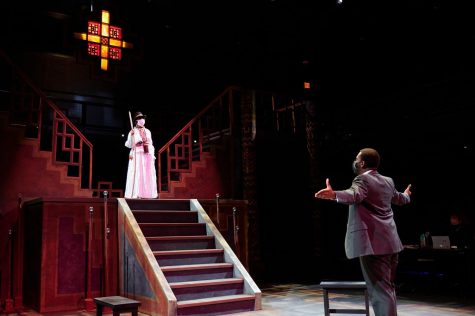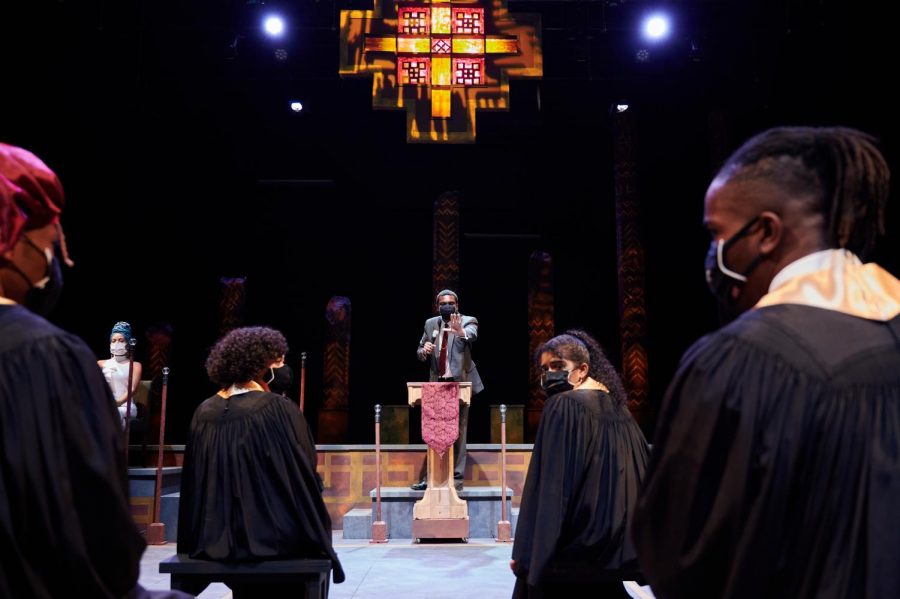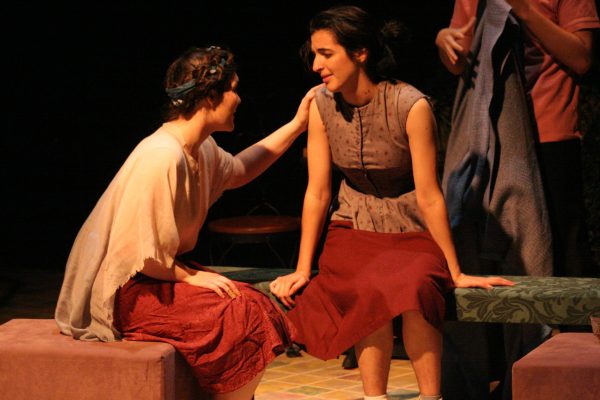Oberlin Theater Performs Zora Howard’s AtGN
Yesterday, the Oberlin Theater department premiered its mainstage production of AtGN, which will be showing through Dec. 12.
On Dec. 9, the Oberlin Theater department premiered AtGN, a modern adaptation of the classical tragedy Antigone. While the play was originally written by the Greek poet and playwright Sophocles sometime around 441 BCE, Oberlin students are preforming Zora Howard’s 2016 version, which weaves contemporary questions into the ancient narrative. Howard, a writer, director, and performer from Harlem, intermingles present-day discussions regarding performative and radical activism with the central tenets of Greek tragedy, offering profoundly resonant ruminations on individual consciousness and collective accountability. Oberlin’s performance of AtGN is the first-ever run of Howard’s script and is showing through Dec. 12.
Howard’s version of the play sets the show in a Black church with a majority Black cast. The play begins as Antigone returns from burying her late brother, Polynices, who was murdered for his homosexuality. Antigone and Creon, a priest, butt heads as she stands up for her brother.
As the show progresses, arguments brew between family members and friends, resulting in the eventual deaths of Antigone; Haemon, Creon’s son and Antigone’s lover; and Haemon’s mother, who commits suicide after the death of her son.
With Howard’s help, director Justin Emeka, OC ’95 and associate professor of Theater and Africana Studies, brings this modern spin on Antigone to the stage of the Irene and Alan Wurtzel Theatre. Howard engaged in transforming the story from script to stage, attending the initial rehearsals and staying involved throughout the process.
“There’s something really exciting about integrating Black culture into classic texts unapologetically,” Emeka said. “Just imagining a world through a Black cultural experience, that’s what Zora Howard has done by essentially placing her story in a Black church.”
At its core, the tragedy of AtGN explores the balance between laws of man and laws of God. Each version emphasizes a unique theme. Howard wanted to tell the tale through the lens of Blackness, modernizing an ancient narrative that may initially seem irrelevant to our time or unrelated to current social issues. Through the adapted story, she highlights Black culture and its legacy.
“These old issues don’t go away, and every generation has to confront these ancient struggles in the context of their own society,” Emeka said.
The contemporary aspect of an ancient show is some- thing that Emeka values in any classical text.
“I think the goal of [classical theater] is to help the audience really connect viscerally and see themselves inside of this ancient story, in these ancient dilemmas,” he said.
The Irene and Alan Wurtzel Theater, where AtGN is performed, is conducive to this intention. The audience sits directly on the stage, surrounding performers. Actors make eye-level contact with audience members and physically involve viewers in the show.

Many students involved in AtGN had previous experiences with Antigone’s story, but the opportunity to perform in a modern adaptation of the Theban play was a unique experience.
College second-year Vera Grace Menafee, who plays Ismene, Antigone’s sister, has acted in a rendition of Antigone before but had a very different cast experience.
“My senior year of high school, I was in a production of Antigone, but was the only Black cast member of the show, which is the complete opposite for this show,” they said.
Menafee is honored to be a part of this project at Oberlin.
“What Zora Howard has created is more than just an adaptation — it is a reimagining of Black stories that have existed and will continue to exist … and we have the honor of sharing [them] in the theater,” they said.
While helping current cast members grow into the roles, Emeka kept in mind the broader context of theater at Oberlin.
“Oberlin College has a unique legacy and commitment to Black people and Black culture through music, through education, and through theater,” Emeka said. “We at Oberlin College have a very exciting legacy with Black theater that extends well before I got here, so to contribute to that legacy is always exciting.”
Unfortunately, the lingering presence of COVID-19 has impacted the production of AtGN. Rehearsals were masked, and so is the majority of the show, with the exception of some tense, emotional moments.
Despite this initial challenge and the impact on rehearsals, the cast is thrilled to be back on stage.
“COVID has definitely affected theater, but theater is resilient,” College fourth-year and AtGN cast member Cyril Amanfo said. “We are affected, of course, but we are big, we are back, and we will be sticking around.”
Emeka has grown to appreciate the masks as he thinks they lend themselves to the show’s modernity.
“I’ve been trying to incorporate the masks into the world of the play in a way that I think the audience is familiar with, given that we’re in a world that demands masks,” Emeka said. “And so, making the world of the play an extension or an abstraction of the world that we’re in now [is important].”
Menafee acknowledged Emeka’s conscious effort to dissolve the feeling of a mask barrier.
“Justin Emeka has been really intentional about staging us distanced, but he has simultaneously been helping us find ways to bridge the physical distance on stage and maintain closeness and connection with each other,” they said.
Emeka has also found that masks enhance the way viewers absorb the script.
“You do find that [masks] tend to go away after a little bit, and everybody in the room kind of forgets about them and … starts paying more attention to the language and … listening closer to the language,” he said.
Howard’s AtGN is a unique play, and Oberlin students have the privilege of seeing its stage debut. The show is running through Sunday, Dec. 12.








